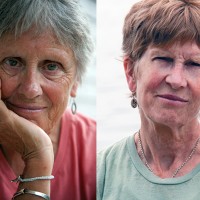The majority of us invest more time planning our summer vacation than making plans for the later years of our life, or even the end of it.
Research shows that most of us would rather die at home (80%, or four out of five of us), but less than half of us actually will; among the many reasons why: We haven’t planned for it.
Many people don’t even believe that they will die! After all, we live in a youth-idealizing and death-defying (and denying) culture. And since many of us are concerned about worrying our families and loved ones with such a depressing topic, more than half the population never even share their concerns or make their wishes known.
Unfortunately, this silence around end-of-life planning creates conditions for disaster, both for ourselves and those close to us.
Without our guidance, family members and other loved ones are left to second guess what kind of death we would have imagined or wanted, what medical interventions we would have welcomed or rejected, or the kind of memorial we would wished to have had. Imagine, if so courageous, family members in the ICU or emergency room, forced to decide whether or not to authorize a risky surgery, or choose to accept palliative care and let someone they love…go.
No wonder families find themselves in so much conflict around death and dying! Yet the end of our lives could be more hopeful.
What if we could find a way to close our lives with intention and meaning?
What if we could have important conversations with our family now, using our clearest voices possessed in our still sound mind and bodies?
It’s not too soon to start.
Public forums for important and needed conversations about the end of life and dying are starting to emerge all over the country. Death Cafes, where groups of people of all ages meet to chat about death over coffee and cake, are an example of the growing need people have to gather and confront the big topic that we so often avoid.
The Death Cafes are not intended to lead participants to conclusions or specific courses of action. Rather, they offer an open, respectful and confidential space where people can both express and explore their views. No bells or whistles! Just death!
Another public forum is The Conversation Project, founded by Pulitzer Prize winner Ellen Goodman. It is a national campaign dedicated to helping people talk about their wishes for end-of-life care, and the goal of TCP is that everyone’s wishes for end-of-life care are expressed and respected.
A “Starter Kit” is offered as a download on the site and provides everything one would need to start the conversation. Ellen is quick to say that regardless of one’s life circumstances, whether someone is young, old, sick or healthy, “…death and dying is a subject that is too often delayed—until it is too late.” Guidelines for starting a death café are available online.
We can open conversations and follow them up by writing about our wishes and desires. We can place these important letters and instructions alongside our wills. We can let our families and friends know how much intervention we would prefer if we became severely impaired. We can make known what would comfort us when we are sick and whom we would choose to surround us at this time.
In my middle drawer on the right side of my desk I keep a folder called Death. In it are my wishes, my bank accounts, all my passwords for my internet accounts, my life insurance policies, and a list of my possessions which I am leaving to each of my daughters. Also in that file is a map of the cemetery and the exact location of my plot, which I purchased years ago at my daughter’s request. She wanted my remains to be in a pastoral location. For the first time in my life I have a small parcel of waterfront property with a beautiful view (too bad I won’t see it!)!
Preparing for the end of life is only one aspect of planning—it behooves us to broaden the conversation. While we are still feeling healthy and alive, we can reflect on our life’s journey and share important turning points, family lore, values and critical decisions.
We all have lessons we would like to share with those we love, lessons that may have been costly to us with the hope that sharing them will spare friends and family from the same painful experiences we went through at one point in time.
For two decades I have led writing groups for profoundly ill people. Knowing they are near the end of their lives, participants find the words to express joy and sorrow, to connect to loved ones, to leave lasting words and directions for their survivors.
Perhaps there are words that live inside you that you have never shared with the people who are closest. Maybe you have an apology to make to someone you hurt, even if it was for something that happened a long time ago. Or maybe you would like to say thank you to someone who helped you in a major way, but may not yet be aware of his or her contribution. Now is the time to find our clearest words. May we begin!
Love elephant and want to go steady?
Sign up for our (curated) daily and weekly newsletters!
Assistant Editor: Andrea Charpentier/Editor: Rachel Nussbaum
Photos: Wikipedia Commons







Read 0 comments and reply